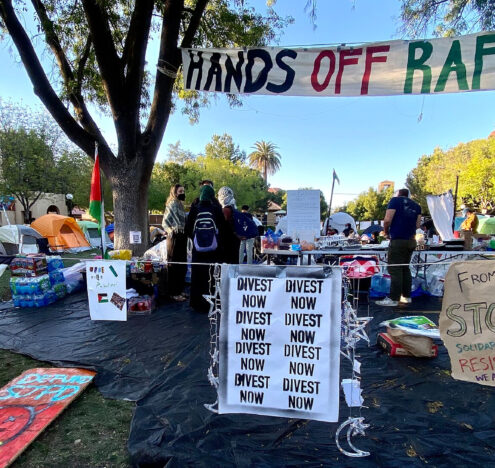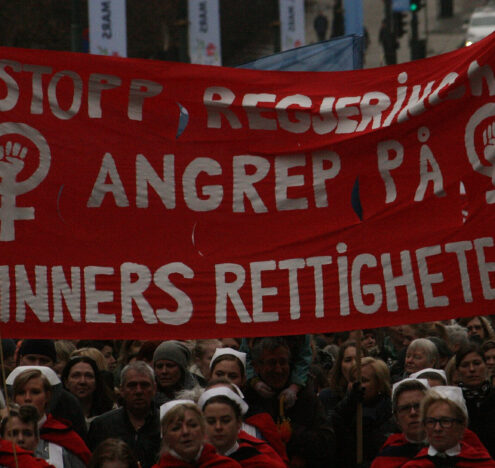In this installment of Inkstick’s culture column The Mixed-up Files of Inkstick Media (inspired by From The Mixed-up Files of Mrs. Basil E. Frankweiler), where we like pop culture with national security and foreign policy, we decree that camo masculinity is out and the Treat Yo-self / Rae Dunn / Cottagecore Self-care aesthetic are in! After all, capitalism and militarism are pills easier swallowed when paired with a spoonful of ashwagandha repackaged and sold by white tourists to India, no?
For my fellow compatriots who are “chronically online” and have been since the dawn of the social media age, it’s easy to see certain online trends or behaviors recycled and reused, albeit repackaged, the way bell bottoms from the 1960s and 1970s are now regaining popularity through the label, “flare.” On TikTok and other platforms, for example, I’ll sometimes see posts from people who say that when they’re in depressive episodes or an otherwise mental health low point, they may try to purposefully isolate and cut people off as a test of “who really cares” about them. Similarly, I log onto Instagram and am met with a horde of infographic accounts trying to tell me about the latest issue that “no one is talking about!” with a 10-page carousel of Canva templates. And I remember through a filter of nostalgia the days when copypastas on Facebook would say something along the lines of “Only REAL friends will read, like, and repost this!”
But is anyone real on the Meta? (I ask both figuratively and literally, given Mark Zuckerberg’s rebranding of his company to “Meta.”)
Gen Z has had an already massive impact on the trajectory of society and culture, partly thanks to the widespread use and potency of social media boosting their voices and actions in a way that earlier generations simply lacked access to. And, while oversharing online is a condition just as prevalent among older social media users as younger ones, the simple phenomena of oversharing means that adapting how best to sell the war-and-profit machine just got that much easier and finetuned. Sure, anyone will support the notion that the youth are our future. The youth are the ones who must bear the consequences of our actions today. Yet, we still see little progress on such fronts as addressing climate change, police brutality, racial and economic inequities, and forever wars. What we do see is the deepening of implicit beliefs in hyper-individualist mindsets that best fester on a widespread sensation of isolation, worthlessness, and futility.
What started as social movements to de-stigmatize mental health difficulties and disorders has become weaponized and co-opted for the furthering of racial capitalism and the military backing necessary to enforce it. And sure, the co-optation of movements for the promotion of the opposition isn’t new. Those older than me are quick to dismiss younger people’s concerns like mine with “Yeah, that’s been happening for ages though.” But what hasn’t been happening for ages is the rapid growth of technology, its use, and how much the growth in tech accelerates these old trends. “Cottagecore” — and its even more intoxicating successor “corecore” — showcase the latest innovations in the co-optation game. The results? The algorithms become more refined each day and alongside that the barriers for buy-in to whatever national or corporate narrative The Big Guy wants us to believe in lowers.
Okay, But What Is Cottagecore?
The truly TikTok savvy would know by now that, actually, cottagecore was the trend about two seasons ago (“season” meaning anywhere between two weeks or six months). But think Avril Lavigne meets a woodsy Zooey Deschanel, Snow White and the Seven Dwarves meets Blink-182, Burlesque meets Midsummer Night’s Dream, ethereal forest fairy meets 1990s grunge. If the vibe is hard to picture, then even funkier, more potent, and leagues more hyper-specific was what followed: corecore. But both are honestly past their peak at this point, so if you bring it up with your kids they’ll probably be surprised you know of the terms but won’t be all that impressed.
In my personal experience of corecore, have you ever watched a piece of media that gave you intense chest pains but in a really soothing way? If so, that’s the appeal of corecore. The mishmash of audio and video clippings ignite a brand of catharsis that is incredibly specific yet simultaneously universal. The manifestation of feeling completely desolate in our darkest moments despite knowing, intellectually at least, that plenty of others have felt similar pain but we, sadly, just don’t know any of them personally.
In the initial sweep of corecore across the internet, young users were quick and excited to claim corecore as the newest great art movement, soon to appear in the canon alongside Dadaism and Surrealism. If the internet has taught anyone anything though, it’s that we can never have nice things, and Salvador Dali was an absolutely horrendous person.
The Venn diagram of corecore is disparagingly complicated. Some corecore content may also qualify as hopecore while others match better with incelcore, traumacore, weirdcore, normcore, the list goes on and on — and that was the point. The practice of adding the suffix “-core” (as exemplified by cottagecore) to a word was to attempt to reduce the meaning, aesthetics, or feeling of the original word down to its most concentrated form. In doing so, online spaces became inundated with all varieties of “cores” that users passionately deemed as discrete and noninterchangeable: “cottagecore” is distinct from “cabincore,” “angelcore” is distinct from “fairycore,” “lovecore” is distinct from “dreamcore” that is distinct from “nostalgiacore.” And so “corecore” came into being out of jest at the absurdity of other “cores” hyper-specificity and oversaturation.
Initially moody and angsty in a youthfully cathartic way, corecore’s Gen Z-branded undertones of depression became overtones laced with a particularly masculine sense of isolation from the world matched only in potency by incel-infested forums like r/RedPill on Reddit. Thus, bringing us back to the core point of this article (see what I did there? I’m still very carefully balancing on this fence between infant Millennial and geriatric Gen Z so admittedly that joke was very “millenialcore,” if you will).
Pendulum Swings: Mental Health and Isolation
In my lifetime alone, I’ve already seen explosive growth in public willingness to openly discuss mental health difficulties. That said, I’ve also been around long enough (believe it or not, my dear older readers) to see that trend leap forward and then veer in a 180. Never one to oppose further opening discussions on uncomfortable topics like extreme grief, addiction, or what it means to set healthy boundaries within interpersonal relationships, I’ve been witnessing in real-time the phenomena of capitalist, consumerist, and colonialist language seeping into the everyday vernacular of these subjects. Take for example a viral post from 2019 meant as a template for people to politely tell friends when they feel unable to provide the level of support others may need from them: “Hey! I’m so glad you reached out. I’m actually at capacity / helping someone else who’s in crisis / dealing with some personal stuff right now, and I don’t think I can hold appropriate space for you. Could we connect [later date or time] instead / Do you have someone else you could reach out to?”
Though well intended, many other users began to mock the template, and some saw the language used as overly sanitized and therefore cold and unfeeling. Conversations around boundary setting and individual capacity levels have become more frequent as more and more of us openly joke about being mentally unwell. On the flip side, I also see online discourse shift from the template posited on Twitter to posts on TikTok asking the question “Is this [relationship or friendship] serving me?” followed subsequently by critique for the use of the word “serving” as if a friendship’s value is quantifiable and therefore susceptible to market-value appraisal.
From comments like “we don’t claim them” from white social media users on videos blasting another for a hysterical racist tirade in public to phrases like “she’s on the market” when talking about a woman’s availability to date, all these examples invoke ideas of ownership, objectification, and some variety of economic valuation on other human beings despite our very public and ongoing struggles to reconcile America’s history of chattel slavery.
Each instance is minute. But like the principle of collective action as to why grassroot advocacy work works, these minute instances of incorporating capitalist or imperial language into our everyday norm add up until we suddenly find ourselves literally among the fishes in that one David Foster Wallace joke. Now, the military can engage with children as young as 12 or 13 while streaming on Twitch. A white tourist who spent 6 months in India can rebrand and sell masala chai as “the coffee of India” (even though “chai” literally means “tea”) without many batting an eye as global nuclear arsenals simultaneously beef up and modernize, allowing the likes of military contractors, corporations, or the already wealthy alike to profit off continued global instabilities and our own mental instabilities.
Treating the Symptoms Instead of the Illness
More than anything, the great connector between all that I’ve so far discussed is, somewhat ironically, isolation. In the initial sweep of corecore across the internet, young users were quick and excited to claim corecore as the newest great art movement, soon to appear in the canon alongside Dadaism and Surrealism. If the internet has taught anyone anything though, it’s that we can never have nice things, and Salvador Dali was an absolutely horrendous person.
Given that corecore is primarily predicated on a community-wide sense of depression and existential fatalism, the first layer of critique the trend faced was how its depressing content (shocker) would make depressed people more depressed. As corecore developed further, it soon plunged headfirst down an alt-right and incel-laden pipeline (incel short for “involuntary celibate” and referring to men who develop extremely misogynist views on women, dating, and society [see: “femcel” for the female version]).
In a world full of contradictions, the increased interconnectedness of the globe via the internet has also heralded a pandemic of isolation whose ubiquity was only heightened by the COVID-19 pandemic. “Doom scrolling” refers to the practice of relentlessly scrolling online despite seeing near exclusively content that just makes users feel worse. But for each new generation of youth, the burden of legacy after legacy of trauma, war, catastrophe, exploitation, and crisis keeps piling on.
As far as foreign policy is concerned, even naming root causes isn’t enough. Repeated talk only about our approaching nuclear doomsday will never reignite the Freeze Movement of the 1980s. Endorsements of empowerment and demonstrations of how young people can have a voice will. Apathy and isolation didn’t well up within Gen Z wholesale in a vacuum. We cannot fearmonger our way to peace.
The societal hope for progress permeating post-war Baby Boomer’s adolescence has been fizzling out for the last several decades with just the crumbs of crumbs left for Gen Alpha at this point — or at least that’s how it feels. Online users can’t stop climate change, can’t convince Presidents Vladimir Putin and Joe Biden and Xi Jinping to become a foreign policy “throuple” (Google it), and can’t halt every stray bullet that flies through an American school hallway, but they can keep scrolling through video after video until they find a collection of other users making and liking content that resonates with their somberness. And that’s when the likes of Andrew Tate, Joe Rogan, and Jordan Peterson can swoop in on young male audiences, hold their hands (only metaphorically speaking because “no homo”), and tell these young men that their feelings are valid and that there is a treatment for relief. The only problem? The prescription comes with severe side effects.
The corecore videos begin similar to the way posts on 4chan or the r/RedPill subreddit begin, with affirmations for the rampant and acute loneliness that men, in particular, may feel. In this compilation video of corecore TikToks, the first few minutes feature videos saying, “I don’t like who I am. There’s nothing good about me anymore,” from @itsfuckingmike; “They ain’t been in your shoes. They say they have, but they don’t know what you goin’ through,” said @h0pe.o; and “Soon, you’ll have forgotten all of this because you’ll be dead,” from TikTok user @joy8nate.
After that, posts feature advice rooted in a broad sensibility, advice like, “You feel like shit? Eat better than just hamburgers every single day and shower more often than once every two weeks.” Or in the corecore compilation from user @downtothecorecore, “…most people overestimate what they can do in a year and underestimate what they can do in two or three decades. And you haven’t been around long enough to have those extra two or three decades.”
Finally, the fall down the pipeline reaches terminal velocity and users coast through content disparaging women for rejecting men’s advances, parading “Alpha male” assertiveness and aggression as the only viable way to “show” women what they want, and all to the tune of “Runaway” by Kanye West in the background as he sings, “let’s have a toast for the douche bags, let’s have a toast for the assholes, let’s have a toast for the scumbags.”
Altogether, droves of online content attempt to band-aid the en masse loneliness many users face rather than addressing the loneliness at its source.
Alright, Alright But Back to Foreign Policy
Hannah Arendt wrote in 1951 about the origins of totalitarianism and the impact of widespread loneliness and isolation on fascists’ relative ease in growth during the first half of the 20th century. “…in order to make individuals susceptible to ideology, you must first ruin their relationship to themselves and others by making them skeptical and cynical, so that they can no longer rely upon their own judgment,” Arendt wrote.
So, I guess you caught me, and the bulk of my argument is indeed “old wine in a new bottle.” An inability to recognize the “new bottle,” however, is exactly what has allowed more and more parents to whisper in panic, “I don’t know how this happened to our son or how he grew up to believe these things about women!” and what has prevented greater, more effective countermeasures to the indoctrination.
To be clear, it’s unfair to expect parents to know every single thing their children encounter on the internet. New trends and slang appear so quickly, and sometimes the trends or slang will be so confined to a niche community, that it becomes difficult for even other young people to always keep up with each new online cultural phenomenon or sensation! The unique manifestations of societal loneliness and isolation online cannot be so easily dismissed alongside the TikTok dances as “those youngin’s and their antics,” however.
“Totalitarianism in power found a way to crystallize the occasional experience of loneliness into a permanent state of being,” wrote Samantha Rose Hill in an essay about Arendt’s writing for Aeon. “Through the use of isolation and terror, totalitarian regimes created the conditions for loneliness, and then appealed to people’s loneliness with ideological propaganda.” And the effects of isolation can be seen on an even more macro level than an authoritarian leader and his public. It wasn’t just Adolf Hitler who preyed on the German public’s fear and widespread sense of isolation in his rise to power, for what caused that widespread sense of isolation? The severe and intentional marginalization of Germany following World War I undermined German democratic leaders and stifled Germany’s ability to respond to the global economic disruptions of the 1920s.
Today, continued US-led isolation of North Korea further exacerbates all the alleged key concerns US diplomats have in negotiations with Kim Jong-un, especially concerns for human rights. Humanitarian supplies, including basic medical equipment or technologies, become more and more difficult to deliver as sanctions become tighter and tighter leading to greater and greater suffering for the common people of North Korea. And as Arendt noted, temptations toward totalitarian solutions strengthen “whenever it seems impossible to alleviate political, social, or economic misery…” Domestically, President Donald Trump’s upset win against Hilary Clinton in the 2016 election becomes less shocking when understood how sidelined the conservative, working-class electorate had been until just the right frontrunner materialized as their collective expression of loneliness and anger.
And so, basically, it’s great and all to talk about problems but not exceedingly productive without naming the root causes. Lack of attribution to the causes of widespread isolation and suffering allowed Andrew Tate to build the platform he now has, allows anxiety to mutiny the climate justice movement, and allows fascist ideologies to take deeper root in the public psyche. As far as foreign policy is concerned, even naming root causes isn’t enough. Repeated talk only about our approaching nuclear doomsday will never reignite the Freeze Movement of the 1980s. Endorsements of empowerment and demonstrations of how young people can have a voice will. Apathy and isolation didn’t well up within Gen Z wholesale in a vacuum. We cannot fearmonger our way to peace.
Engaging with media that express depressing or overall negative emotions is itself not the problem. Consistently, my top artists on Spotify Wrapped make some of the most gut-wrenchingly depressing songs. Rather, engaging with such media as corecore too much and without a critical level of mindfulness can burst open the doors for bad actors like Tate or the next Benito Mussolini to enter while closing all the windows and blinds to further seal us away from any sunlight. That said, rest assured, parents, the internet is equally rife with hope as it is with loneliness. Countless communities have formed online that are no less valid, fulfilling, and wholesome as in-person communities can be. But not everyone and everything will lead us in good faith. And like the old saying goes, “it takes a village.” Or maybe, in this instance, a village of cottages.





















